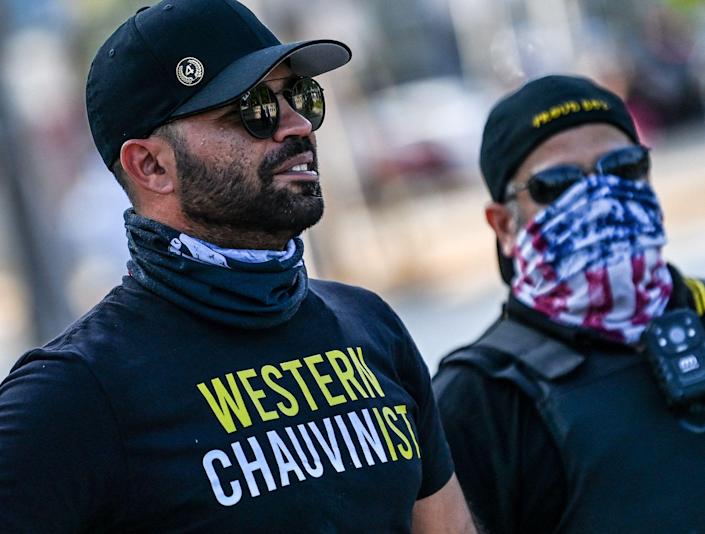Nick Fuentes, identified as a “white supremacist” in the Justice Department’s files, made headlines last week for hosting a white nationalist conference in Florida. His father is also half Mexican American.
The big picture: Fuentes is part of a small but increasingly visible number of far-right provocateurs of Hispanic background who spread racist, anti-Semitic messages.
Get market news worth your time with Axios Markets. Subscribe for free.
Send the news: Cuban American Enrique Tarrio, the former leader of the Proud Boys, a group the Anti-Defamation League calls an extremist group with a violent agenda, was arrested Tuesday and charged with conspiracy in connection with the Jan. 6 Capitol riot.
What they say: Experts tell Axios that far-right extremism within the Latino community stems from three sources: Hispanic Americans who identify as white; the spread of online misinformation; and persistent anti-black, anti-Semitic attitudes among American Latinos that are rarely discussed openly.
-
Brian Levin, director of the Center for the Study of Hate and Extremism at Cal State University, said in an interview that the trend is “part of the mutation that happens when the racist fringe tries to become more mainstream.”
-
Racism is deeply ingrained in Latin American and Caribbean countries, where slavery was common, said Tanya K. Hernández, a Fordham University law professor and author of the upcoming book, “Racial Innocence: Unmasking Latino Anti-Black Bias” , to Axios. “In Latin America, white supremacy is very much alive.”
-
Even families who have lived in the US for generations can often carry those prejudices with them.
Between the lines: The trend in the US, fueled during Donald Trump’s presidency and the pandemic, extends from movement leaders to a wider network of participants, some of whom have faced hate crime charges.
-
Last month, Jose Gomez III, 21, of Midland, Texas, pleaded guilty in federal court to three counts of committing a hate crime for assaulting an Asian-American family, including two children, he believed were responsible for the pandemic.
-
In 2018, Alex Michael Ramos, a Puerto Rican resident of Georgia, was sentenced to six years in prison by a Virginia district court for his role in beating a black man in Charlottesville, Virginia, after the “Unite the Right” rally.
-
Christopher Rey Monzon, a Cuban-American man and member of the neo-confederal group League of the South, was arrested in 2017 for attempting to attack anti-racist protesters in Hollywood, Florida. He later resigned from the group, saying he regretted using slander against black and Jewish people.
context: At the Orlando conference, which made headlines because U.S. Representative Marjorie Taylor Greene (R-Ga.) accepted an invitation to speak, Fuentes drew attention to comments of his own†
-
“And now they go on and on about Russia and Vladimir Putin is Hitler – they say that’s not a good thing…” He then laughed and said, “I shouldn’t have said that.”
-
Fuentes has questioned the holocaustcriticized interracial marriage and defended Jim Crow era segregationN. The ADL describes him as “a white supremacist leader and podcaster looking to forge a white nationalist alternative to the mainstream GOP.”

Proud Boys leader Enrique Tarrio wears a shirt in support of Derek Chauvin, the police officer convicted of the murder of George Floyd. Photo: Chandan Khanna/AFP via Getty Images
But, but, but: There are limits to how accepted some far-right Latino activists can become in white supremacist and neo-Nazi circles, Mark Pitcavage, a senior research fellow at ADL’s Center on Extremism, told Axios.
-
Some extremists on 4chan and 8chan say Fuentes’ Latino heritage disqualifies him from talking about white supremacy, Pitcavage said. Meanwhile, some white supremacist elements of the Proud Boys reject Tarrio as a leader, but so far he has endured the criticism, said Pitcavage, who follows the chats.
Tarrio’s lawyer, Lucas Dansie, did not respond to emails requesting comment. Fuentes’ American First Foundation also did not respond to requests for comment.
What are we looking at: American Latinos who identified as multiracial have soared over the past decade, while those who identified as exclusively white have fallen significantly, according to the latest census.
Subscribe to Axios Latino and get more news that matters about Latinos and Latin America delivered straight to your inbox on Tuesdays and Thursdays.
Editor’s Note: This story was first published on March 10.
Do you like this article? Get more out of Axios and subscribe to Axios Markets for free.

